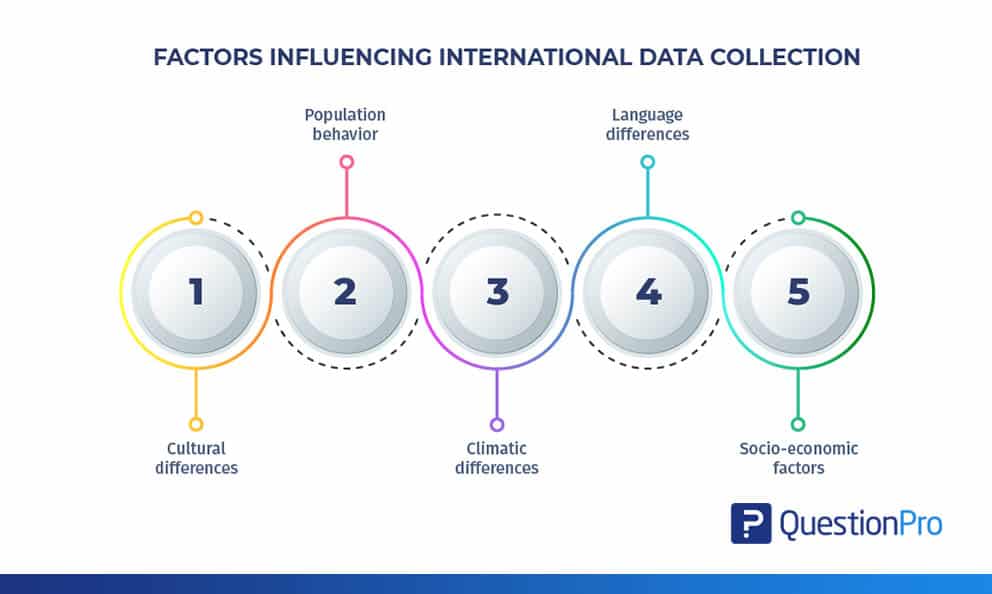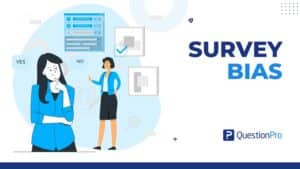
What is meant by international data collection?
International data collection is defined as the procedure of collecting, measuring and analyzing accurate insights from an international audience for market research. This collection of data is done using standard validated techniques. A researcher can evaluate their hypothesis of a particular country, continent, or ethnic group based on the collected data.
Today, the world economy has been globalized. It means that, at a macro level, the whole world is increasingly behaving as though it were an area of one market, with dependent production, consuming similar merchandise, and reacting to the identical impulses. Yet, at a micro level, every market acts and reacts differently. To be a successful player in the market, large organizations have to understand and adapt to every aspect of the local target audience they wish to cater to. QuestionPro Audience provides you a robust tool to reach and connect with research participants all over the globe.
Example of the use of international data collection
If a clothing brand wants to launch a line of clothing globally, they have to be sure that the product does well in the targeted market. If the brand does not have an experience of catering to the foreign market, it may or may not succeed. It is highly important to know and understand the clothing trends and what the market expects from the brand before going live in the location. Collecting and analyzing data about your target region will go a long way in the success of the product or brand. For this purpose, firstly, the brand needs to gather a sample of respondents who use similar products.
Learn More: Data Collection Methods: Types & Examples
The role of international data collection in market research
There is a difference in collecting data locally and acting upon it globally and conducting international online data collection for worldwide applications. Data collection is the primary and most important step for market research, irrespective of the field of research. The difference between international and domestic market data collection is the importance of minute details. Believe it or not, even the difference in the smallest details may have an impact on your market research success.
Different cultures will respond in a different way to your business, marketing, and products. Some markets will be capable of using the products differently than expected. You require knowing how each of the markets in each country or continent responds to your brand and the market in general.
The strategies applied successfully in one location may not necessarily be fit for a different location or country. If you are not familiar with the culture of a specific country, be ready for surprises. It is of utmost importance having international data available at your disposal to rightly target the global audience.
Keep in mind that the approach of international data collection is different for different fields of study, depending on the required information. The most critical objective of international data collection is ensuring that information-rich and reliable data is collected for statistical analysis so that data-driven decisions can be made for research.
Why is there a need for international data collection?
The world is getting smaller and more interconnected than ever before. But don’t mistake that degree of closeness for uniformity. There remain stark differences among humanity’s social groups, many of which can pose a threat for market researchers trying to collect data from various cultures. Nobody desires to stereotype any culture, but the truth is that notable differences exist within societies. This will lead to inaccurate and ultimately useless market analysis if left unchecked.
To accurately compare brand performance across countries, it’s necessary to collect international data and understand and incorporate cultural variations into research methodology. You require a dedicated set of authentic audiences to help you research your area of interest.
But how can you conduct international data collection at ease? Check out QuestionPro Audience to help answer this important question.
Factors that influence international data collection
Following are the factors that influence international data collection:
- Cultural differences: Culture refers to broadly shared standards or patterns of behavior of a huge group of people. Every culture reacts differently to different brands. Brands have to localize the product before launching it or they may face issues. For example, McDonald’s beef burgers are very popular in the US and Europe, but they simply will not work in India due to such a huge cultural difference.
- Population Behaviour: It is the values, attitudes, beliefs, artifacts and other meaningful symbols depicted in the pattern of life embraced by persons that help them understand, assess and communicate as segments of society.
- Climatic Differences: Products will react differently in different climates. For example, a strategy applied to sell ice cream in the Middle East will be way different than that in Alaska. The climate of the region will determine how the population will react to that product.
- Language differences: It is important to have multi-lingual surveys set up to adapt to and suit the needs of the target locations. Localizing your study to gain insights will help gain better and accurate responses.
- Socio-economic factors: Socioeconomics is the social science that studies how economic activity influences and is molded by social processes. These factors have to be taken into consideration while conducting an international data collection.
Sample selection made easy
Most market studies include a sample or subgroup of the entire population connected to the issue rather than a census of the entire group. The population is generally specified as a part of the problem definition process. Subgroup analysis is crucial for tailoring treatments to specific patient groups and optimizing healthcare outcomes.
Are you looking for IT professionals who work at companies with more than $10 million in revenue and headcounts over 150? Are you looking for fashionistas between the ages of 21 and 30 with an affinity for shoes?
Most data providers could take care of the request before breakfast in the US, where the majority of available data is compliant, current, and detailed. But if a brand’s looking for international reach and scope, the assignment is a bit trickier.
Before continuing, we want to invite you to check out our most recent article: Best Data Collection Tools.
QuestionPro’s expert assistance in international data collection
One of the key elements of an efficient survey tool is assuring you have a quality sample to survey. What if you want to conduct an international branding survey or a blind study with a specific, targeted audience?
A well-recruited and maintained panel can provide a better quality of data than any other methodology available. Respondents can complete surveys at their convenience. The data can be collected in less than 24 hours. Online panels also offer more data quality control. More than 80% of Americans are online today. This figure grows globally. As such, this will soon become the default data collection methodology of choice.
As one begins to construct a survey, it is crucial to ask the company providing the data with certain questions to assure the sample quality. Sample questions include:
- How is the panel recruited?
- What systems do they have in place to counter panel attrition?
- How do they incentivize their members?
- What is the makeup of the panel?
Knowing the difference between a panel and a sample – and what’s best for the survey at hand – is a critical component for conducting effective online surveys. Don’t make the mistake of constructing a survey when the respondents may not be the right people to give the answers.
Challenges of international data collection
The main challenge that comes to the minds of researchers is how are they going to reach out to respondents in different locations. Researchers are never sure how respondents will react to the survey. Will they be interested to take part in a study that is not even being organized from their location? As every location is different and reacts differently, the task of conducting research activities in a foreign location will be a tough job. It is not impossible to gather data internationally, but it will surely be a time taking and expensive affair.
Overcoming data international data collection challenges
It may be highly important to save time and money by partnering with a reliable and strong sample audience provider for your research study. QuestionPro Audience provides you a ‘virtual’ core competency in fieldwork, sampling, data collection, scripting, data management strategy and, data processing, depending on your specific needs.
LEARN ABOUT: Behavioral Competency
You profit from great quality, reliable data you can trust, dodge unnecessary errors and hassles of global research, and save time and money.







